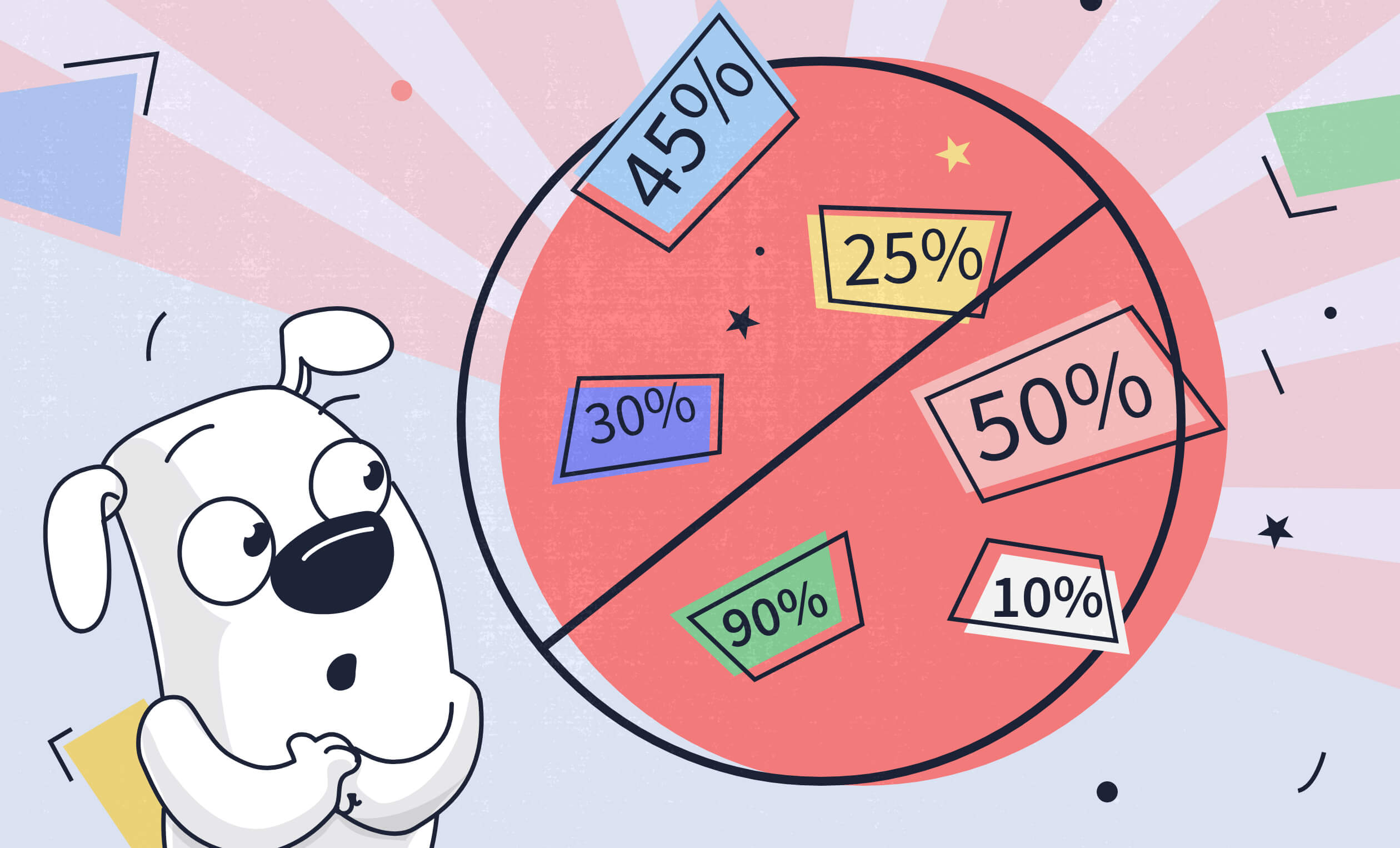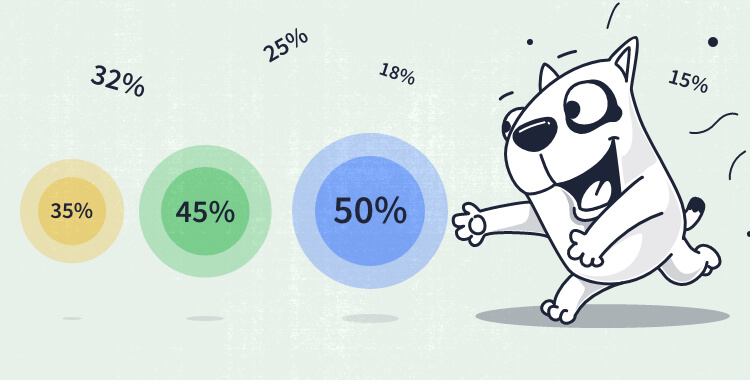When Not to Give Discounts to Clients

Block pricing discounts in the service industry especially things like web design and development are a bad thing. Devaluing your service and in many respects your image and ethos. There are many good reasons why see To discount or not to discount? That’s not even a question.
Whilst we don’t want to stifle your creativity in hunting for projects and it’s always good to be flexible, you really need to be strong as far as discounts are concerned, you are not a bargain basement superstore, you are a professional creative outlet full of experience and knowledge.
However, it’s fair to say it’s a competitive market and there may be times and exceptional situations when you have to or want to consider discounting.
Let’s take a look at the specifics.
Don’t discount to first-time clients
There is a huge temptation to try to win projects by offering fantastic discounts, especially with first-time clients. A belief that if you make them an offer that wipes the floor with your competition, you get this project and they’ll come crawling back for more. This may be true but they’ll come crawling back for the same prices, and then your problems really start.
Imagine you’ve knocked off 30% as an introductory discount for a particular new client, they come back with a similar project. You are the same, the project is similar, but you quote the full price. Suddenly, as far as the client is concerned you’ve got 30% more expensive. They’ve already gotten used to your cheap prices, in the best case scenario they are in a great negotiating position, in the worst case they’ll think you’re taking them for a ride to find someone else.
We know you want and need new clients, it’s just that pricing discounts aren’t really the way to go. Get creative and push the idea of increasing value rather than reducing the price.
Don’t discount if the clients haven’t asked

This is such an easy trap to fall into. The client is happy with the quote, if they are returning client they are obviously happy with the service, all is well. Suddenly you offer a discount, they didn’t ask for one but of course, they’ll accept.
Why have you done this? You’ve lowered your price, you’ve lowered your profit. Are you trying to make the client happy, to keep them coming back? They already are…..so what have you achieved except for turning into a cheap salesman. At the back of their mind, you’ve now left the suggestion that you were over-charging previously. You’re dealing with business people, they know how these things work. But you justifiable cry, “we want them to feel appreciated”.
There are others, better, more memorable ways. Small token gifts at holiday time, mentioning their birthdays, cards, personal touches that mean so much more. You are showing your appreciation by taking a personal approach, showing consideration and care. This is much more memorable and ….cheaper.
Avoid volume-based discounts
In the short term, volume-based discounts may win you a client but in the long run, you are significantly lowering your profit. These should 100% be avoided when trying to win new clients. You can suggest it may be possible in the future, and dangle a carrot but not all clients are people you want to be trapped on a desert island with. If you’ve established a volume discount from the off and the client is awful (it happens) then you are in a sorry position. If I run a bar and offer a free beer for every 3 drunk, I’m encouraging the customers to drink. I’ve worked in bars and let me tell you there are customers that I would prefer never to drink again.
Supermarkets do two for the price of one, web agencies do not. A supermarket can lose money on certain products because they understand that people will come for these products and whilst browsing buy other things. There is a trade-off between the customer-attracting loss leader and the overall profit per customer. Unfortunately, you do not have the same trade-off, it’s unlikely a client is going to come sniffing for the two for one websites and take away a cartload of digitally animated characters from your sister company.
And let us emphasize right here, again, and again, these kinds of offers affect your image. They are needy, they show that you’ll negotiate for projects and they put you in a weak bargaining position.
Be careful with loyal-clients/VIP programs
Volume-based discounts for loyal/V.I.P clients are an interesting aside to the above. It can work in helping you keep clients and develop partnerships. However, you need to think carefully before entering into this sort of agreement. Firstly the client needs to be a welcome client. If you are getting lots of projects from clients who are particularly difficult then it isn’t good for your mental health or your staff. You start to dread the next project pinging its way to you with its vague ideas, and wishy-washy details.
The other issue that is absolutely vital that you consider is if you become reliant on the volume expected from these clients, you employ staff, increase resources because of guaranteed demand, then you become reliant on the success of a business that you have no control over. They may be great clients, and send you work whenever they can but like all businesses they can get into problems. If they start to have problems, maybe through no fault of their own, think Covid, then your reliance on them becomes an issue for you.
Always ask yourself, what would happen if they went under. Would you be dragged down as if you were in the stormy sea trying to save a drowning man, or is it better to keep your feet dry and throw them a rope.
Beware of the hunters

Some clients will search and scour the net for the lowest prices. Their first messages are about price, discounts are their main focus. They’ll come to you if you make them the right offer and as soon as someone comes along who is cheaper they’ll be off.
Forget relationships, promises, past successes….the girl who leaves her ex for you because you’ve got a BMW, is the same girl who is eyeing up your friend with the Porsche.
Okay, but when is it OK to give discounts to clients?
Gosh, it’s all been so negative so far, we agree. Discounts – don’t do it.
But come on, there must be some ways we can give discounts for positive reasons.
Well, yes in some limited situations. Let’s take a look at how discounts can actually enhance your business and strengthen your relationships with the client rather than damaging your brand, image, and profit margin.
Do good – give discounts to nonprofits
Discounts for Nonprofit making organizations are becoming more and more popular as a way to recognize and show your appreciation for charitable organizations and foundations big or small. Many big businesses such as Microsoft and Zoom offer significant discounts that help nonprofits function. This should be seen as the reason – a chance to give something back.
But business is business and such discounts serve to show your company in a positive light, ethically and morally and the work done itself is often an advert for your services. Note that these organizations need checking out thoroughly, they should be registered and be sure to look at what they actually do before making decisions that will associate your company with a certain charity. The charity should be one that you are proud to be associated with and serves to improve your brand and improve your image.
Give discounts for personal projects
Some projects may be of a personal rather than a commercial nature and in a similar way to discounts to nonprofits they can be subject to slightly different rules than the usual pricing strategy. Personal projects often do not have access to the budget of businesses, and a discount may help them get something off the ground that is worthwhile. We are talking discounts to make your work accessible, not freebies.
Again this kind of work should make you feel good inside but from a business point of view you are increasing turnover, it’s an advert for what you can do, it can be great PR, and you can get orders on the back of this kind of project.
Give discounts if you can get something in return
There are certain projects that you feel good about and want to do. The obvious ones such as projects for charities or even certain personal projects but sometimes projects that challenge, intrigue, look interesting. Still, If you are giving a discount, it doesn’t have to be for nothing.
Why not get creative with your discounts and ask for a return on your slight financial hit. Most people are happy to offer a testimonial in return, and if the testimonial is from someone high profile – even better. Why not offer a discount if you can use the project as part of your portfolio. If a project will allow you to gain valuable experience or practice skills, a discount is an investment. You can get paid – albeit not the full amount -for a kind of training dry run.
This works as a mutually beneficial arrangement, you are making an investment rather than just giving a discount away. In addition, many people feel more comfortable accepting discounts if they feel you get something in return. Think of the child who brings the apple for the teacher, the teacher appreciates the gesture, the child feels they are paying a little something for the kindness and attention.
Give discounts when you’re client’s business is having hard times
Times are tough, and as soon as everybody starts pulling up the drawbridges then everyone is going to suffer. It’s great to help out people in difficult times, give a helping hand through a dry patch but remember these are your clients, not your friends. There may be times when your client needs a little discount, a shaving off the top of your margin to get them through a tough period and if you can help it might be appreciated in the long run but be careful you don’t want to be throwing away good money after bad. Assess your relationship, think about how much help they need, and how much you can give, you don’t want to be slitting your own throat to save the skin of someone who’s already on their deathbed.
My father had a bar in a rough area and often customers would run out of cash and ask to borrow enough for another drink or two. He never lent to good customers, the regulars who came every day and were good company but he would often lend to the fools who floated from bar to bar causing problems. I once asked him why. His reply was simple: the customers who come every day were your bread and butter, they had the integrity and honesty that made them good customers. If they had borrowed you would not see them again until they had money to pay because they were embarrassed. This way you’d lose their custom throughout this time. (He’d rather buy them a beer himself) The ones you didn’t want wouldn’t come back either because they’d got some money for nothing and didn’t want to pay it back. But frankly, it was losing a little to get rid of them, great long term strategy.
The point being, choose who you want to help and help them in a way that doesn’t make them feel embarrassed for asking. The others you can do without.
Give discounts for pre-payments
Prepayment discounts can be a great way of discounting but still establishing a partnership with a valuable client. If a client wishes to hire you for 6 months and will pay upfront, why not offer a little reward, you’ve got the money to tide you over, the peace of mind is worth it. If a client is happy to pay for a project 100% upfront, they deserve a discount for their trust in you.
The service should be as good as when you are waiting for payment, these kinds of clients deserve to be looked after.
Give discounts for cash or bank-wire payments
A discount for cash or payment by bank-wire transfer means that you don’t have to pay the usual payment gateway fee. Why not pass this saving on to the client, you end up with the same profit, the client ends up with a cheaper project…win-win
Give discounts only if you have a clearly written discount policy
A clearly written discount policy is a godsend, a lifesaver. Any issues can be referred to a previously written document, it stops you bearing personal responsibility for decisions especially if it involves clients that you’ve built up a more personal relationship with. It’s in black and white, this is company policy.
Give discounts if all your clients are aware
Your discount policy is a statement of company policy that applies to all clients regardless. It should be fair, it should be transparent and it needs to be stuck to. No exceptions.
Closing words
We’ve advocated a big no to the idea of discounts, but of course, we want you to remain flexible. A discount should never be a something for nothing gesture, always, always, always get something out of it. By giving things away for free you are devaluing everything about you, your business, and your product. Freedom to negotiate is fine but you have a bottom line and you don’t even want to be near it. If you are being dragged to the bottom of the ocean cut the rope.
A solid foundation helps you negotiate from a position of strength and if there’s one thing that helps create strong, lasting business relationships, it’s mutual respect. Don’t be a doormat.
You may also be interested in some of these articles: